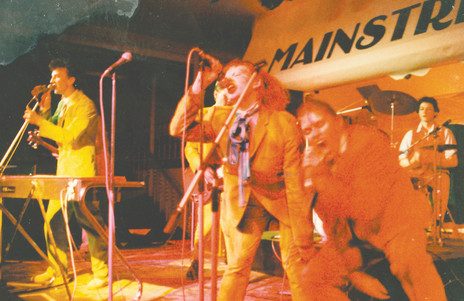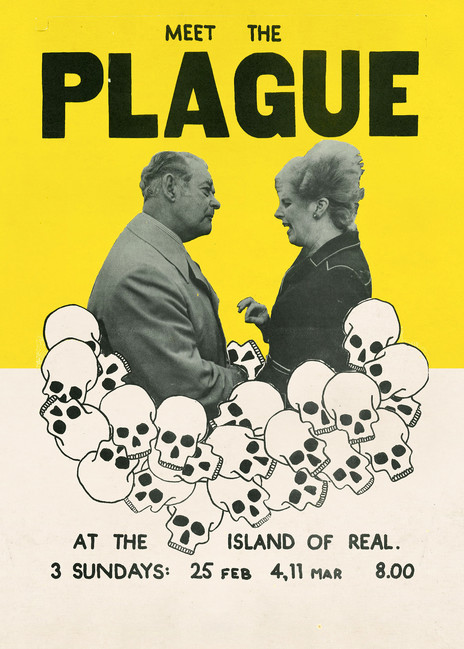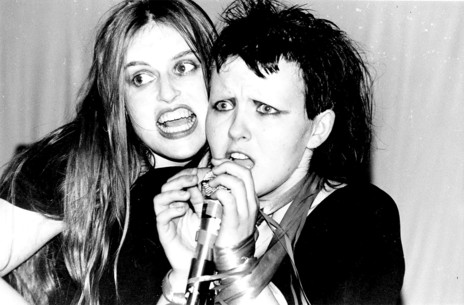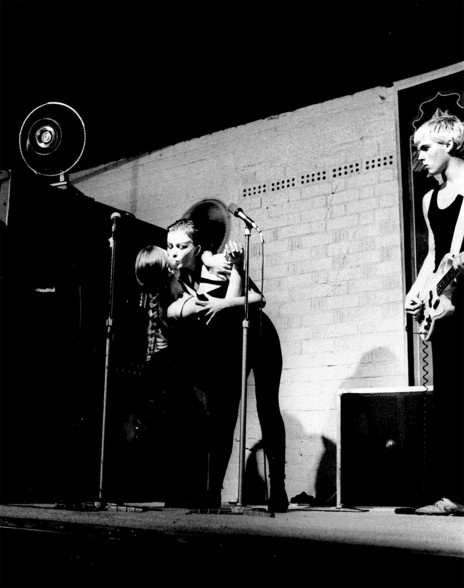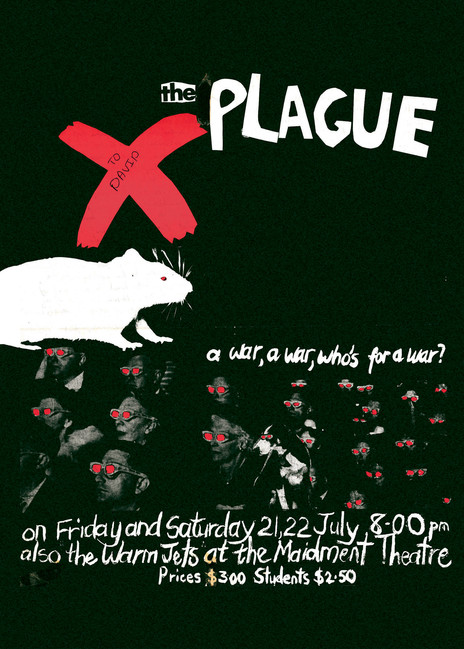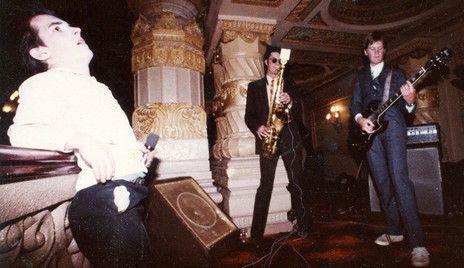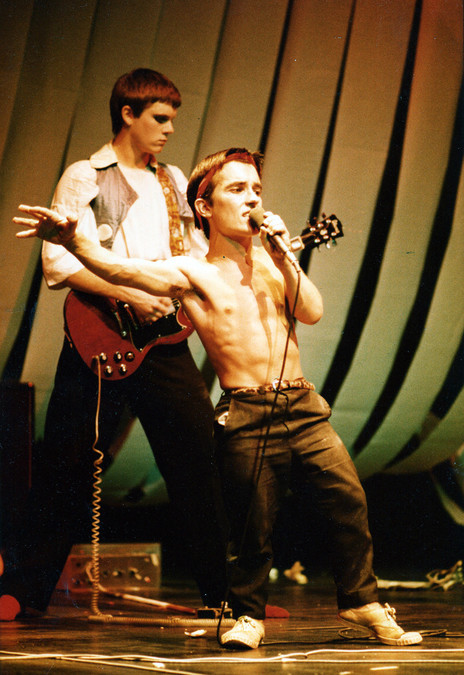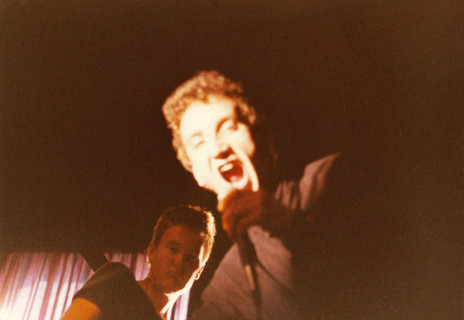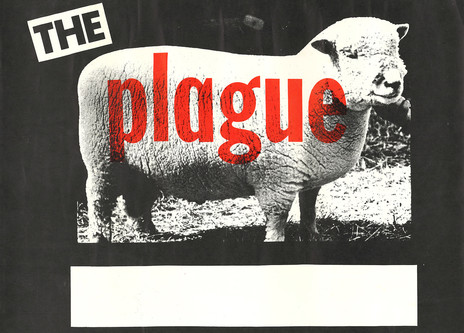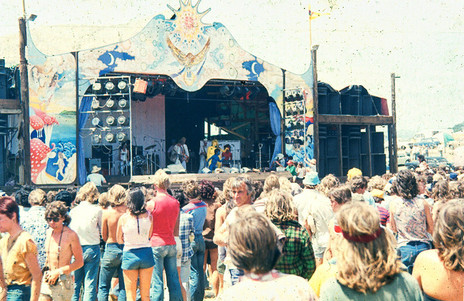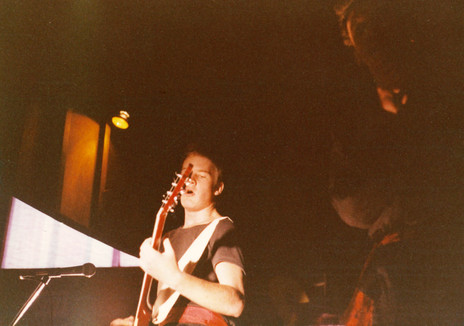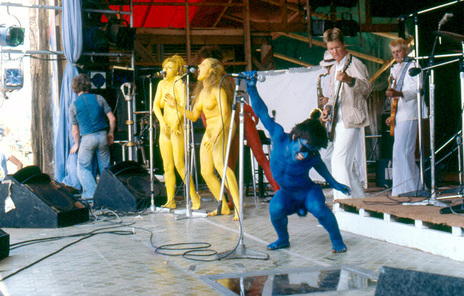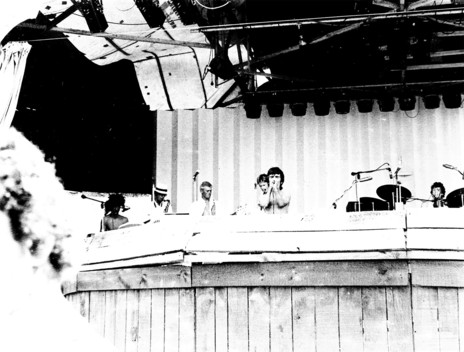The initial line up of The Plague included Tim Mahon, a high school student, and David Parkyn, a writer, on guitars; John Schmidt, a male nurse, on bass; Adrian Hart, Auckland’s foremost Proust scholar, on drums; and myself on vocals. On backing vocals were The Snoids: Charlotte Wrightson, a language and politics student; Miles McKane, a fine arts student; and Sally Griffin, an artist.
Adrian was so nervous about keeping the beat that he often stopped playing the drums mid-song.
Adrian was so nervous about keeping the beat that he often stopped playing the drums mid-song. But our early audiences loved him because he looked so intense and sculptural on stage. While singing, lying on my back, I had to be careful not to be stepped on by Tim, who had a habit of careering about with his guitar.
I live in Executive Row / just off Privilege Place
I build my castle there / far from the common rat race
far from the rest of humanity / and that’s a lovely place to be
in my very own private property
(chorus)
Private / Private / No Entry
Private Paranoia / Private Property
These lyrics were a response to the profusion of private property signs that were springing up on front lawns around Auckland. Today there’s no need for such signs as suburban mansions are protected from outsiders by high walls and fences. I knew that our songs were having an effect when someone painted the chorus of ‘Private Property’ in large letters on a garage door in Ponsonby. The words remained there for several years.
The Plague had a series of striking posters principally designed by Sally Griffin and Miles McKane. One featured a cinema audience wearing 3D glasses. Overhead, in bold letters, was a line from our song about the RSA, ‘A War, a War, Who’s For a War?’
A war, a war, who’s for a war?
A war, a war, we’re for a war!
A war against the students / a war against the left
A war against the unions / a battle to the death
Just let me catch my breath
(chorus)
RSA / RSA / RSA / RIP
RSA / RSA / RSA spells bigotry
The morning after a midnight paste-up, I saw an old man on the corner of Victoria and Kitchener Streets, clearly enraged, tearing down one of our posters from a wall.
As I was a performer more than a singer, The Plague songs sounded more like chants. Some of the lyrics were very simple and relied on repetition, like the RSA song, and one about Frank Gill, a National Party politician who wanted to ban the contraceptive pill:
Now I won’t beat about the bush
I’ll lay my facts on the line
Frank Gill is an idiot
An idiot / an idiot
I’ll say it one more time
Frank Gill is an idiot
There was a rumour that A Cabinet minister planned to take legal action against us.
There was a rumour that Frank Gill, the then minister of Health and Immigration, planned to take legal action against us. But nothing happened, and I suspect he didn’t want the publicity of a court case in which the defamatory lyrics would be highlighted.
As well as songs against politicians, we also had a song about a paedophile (‘Uncle Adrian’), an axe murderer (‘Peter Peter’), and a necrophiliac (‘Huey’).
When the soul is gone, the body is mine
With a dead lover it can’t be a crime
Compatible people are very hard to find
These songs gave full scope for the Snoids to unleash their theatrics. Our first performance as The Plague was at Charley Gray’s café, The Island of Real, on 2 July 1978. The next venue was the Freeman’s Bay Community Centre where we performed for a workers’ conference. After this John Schmidt left the band to concentrate on nursing, and Gray Nicol, a conceptual artist, joined as a saxophone player. We then entered the 1ZM Rock Competition, after being chosen as one of the six best bands in Auckland. Although we were prevented from performing one number, ‘What Comes Next?’, which had a chanted chorus “Fuck we future damn sex” (words I had seen written on a wall in London), we did win the prize for the best original song with ‘Carcinoma’.
You love death on TV / You love death in the movies
You’re unmoved by slaughter / But when it comes to cancer
Ah, when it comes to cancer / Perhaps it’s in your body
Now that’s a different matter / Because there is no answer
(chorus)
Oh, Oh carcinoma / No little misdemeanour
You were a Casanova / until the growth took over
On July 21 and 22 The Plague staged a concert at Auckland University’s Maidment Theatre, playing 17 original songs to enthusiastic audiences. A young band, The Warm Jets, was our support act. After this high point, David Parkyn and Sally Griffin left to work on their own projects, and Adrian retired from drumming to continue his reading of Proust.
Adrian retired from drumming to continue his reading of Proust.
However, three key members of The Warm Jets joined up: Ian Gilroy on drums, Mark Bell on guitar, and Andrew McLennan on vocals. The average age of the band dropped considerably, but we now had a firmer musical foundation. Several months and several performances later, Miles McKane exited to become a member of a theatrical group, Debbie and the Dum Dums, and Sarah Fort signed on as a Snoid.
Then, in January 1979, we travelled to the Nambassa Festival, south of Waihi. Tim had badgered the promoter into getting us onto the main stage. And when we appeared at midday, thousands of people in a single, vast wave flowed over the surrounding hills and into the valley to watch us perform. This was due to my being naked and body-painted blue, while Charlotte and Sarah were naked and yellow, and Andrew was naked and red. The other members of the band were dressed in white to act as a canvas for our primary colours. We used Split Enz’s caravan to apply the body paint and left it a complete mess.
It’s the end of January / the end of the seventies
And Jennifer’s out there / pretending to be stoned
And I’m here on stage / where I want to be alone
Nambassa / I want to be alone
After Nambassa it was my turn to take leave of the band. Andrew took over as lead singer, and The Plague began to tour around the country. I continued to write lyrics for the band, and for a number of other groups, among them Rex Reason and the Rationalists, Avant Garage, Coconut Rough, and Otis Mace.
The Plague eventually transformed itself into The Whizz Kids, and then into Blam Blam Blam when Don McGlashan teamed up with Tim Mahon and Mark Bell. The Blams in many ways fulfilled the original promise of The Plague, both musically and lyrically. Several Plague songs became part of Blam Blam Blam’s repertoire, however their first hit, ‘There is No Depression in New Zealand’, was originally a song from Inside Information, a cabaret group that Don McGlashan and I were part of, along with other ex-Plague members, in 1979 and 1980.
The poster for one show, also entitled ‘There is No Depression in New Zealand’, depicts Rob Muldoon seated at his desk, smiling, while in the background a sorrowful assembly of citizens languishes behind bars. The oppressiveness of the Muldoon years continued to provide fertile ground for our creative endeavours. Another song from this show, ‘Who Killed the Prime Minister?’, was about an absent-minded assassin who keeps waking up at the wrong time.
Here’s a box of beehive matches / strike one you’ll go up in flames
Our life on this earth is so limited / but good products never change, change
Good products never change
He had an excellent idea / he’d kill the Prime Minister
Each day he woke at 5 a.m. / but the p.m. was elsewhere, elsewhere
Over a four-year period I wrote the lyrics to about 80 songs, most performed and a few recorded. The ones I’m most fond of, on looking back, are those that have a strong element of the absurd. I’ll end with ‘Twizel’, a song written for Rex Reason and the Rationalists and also performed in Inside Information’s second show, The Next Big Thing.
Twizel Twizel / The fish fish fish fish
Twizel Twizel / The fish fish fish fish
The fish fish fish fish / swim in your eyes
Your industrial eyes / your espionage eyes
Fin fins / fins the finish
He was a butcher / till we asked him to dinner
He was a baker / till we asked him to breakfast
Now he’s an oil well / somewhere in Texas
